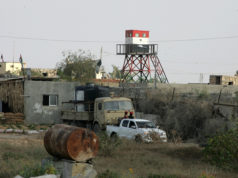Jordan, Egypt, and Bahrain – three of the U.S.’ closer allies in the Middle East – are set to hold general elections in October and November, but not much change is expected within each country.
In Jordan, where elections will be held November 9, the ruling Hashemite family faces little challenge. This month, the government’s largest opposition – the Islamic Action Front, the political wing of the Muslim Brotherhood in Jordan – announced it will boycott next month’s elections, citing the kingdom’s failure to provide adequate assurances that the votes “will not be rigged” this year as the reason. In 2007, the government reduced the representation of urban areas, which are traditional Islamist strongholds, in favor of rural areas, that are more loyal to the king, in order to ensure the election of a majority of pro-Hashemite legislators.

Opposition activists hang posters in Cairo. |
|
Meanwhile, in Egypt, which goes to the polls on November 29, President Hosni Mubarak’s National Democratic Party is expected to remain in charge, although its opposition, the Muslim Brothers, will participate in the elections (as independents, since the Brotherhood is illegal in Egypt). Tellingly, since the Brotherhood said it would run, government intimidation has risen sharply. Dozens of local campaigners have been detained and police stations have refused to grant a number of Brothers the certificates needed to register as candidates. In addition, the state has tightened controls over the media, pressing private broadcasters and newspapers to mute critics of the regime.
Finally, in Bahrain, set to pick parliamentary members this Saturday, the government has arrested hundreds of young men along with 23 prominent figures, including Shia clerics, in the weeks leading up to the elections, accusing them of either spreading false information, inciting violence, fomenting terrorism, or plotting to overthrow the government. Bahrain, comprised of 60-70 percent Shias, is ruled by the Sunni al-Khalifa family, and voting constituencies are gerrymandered to boost the latter sect’s representation.
It’s important to note that in each of these countries, none of their respective parliaments hold sway over the ruling family or president. Nevertheless, the electoral contests provide a rare opportunity for the repressed populations to participate in an important democratic institution as well as organize dissent against the regimes in power. One can only hope that with time, and perhaps with the West’s assistance, the countries’ citizens will demand – and witness – free and fair elections and a government whose elected officials have a say in the direction of the state.





